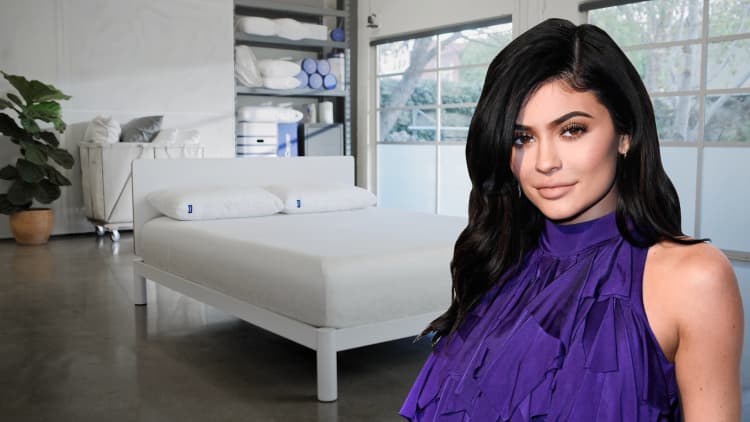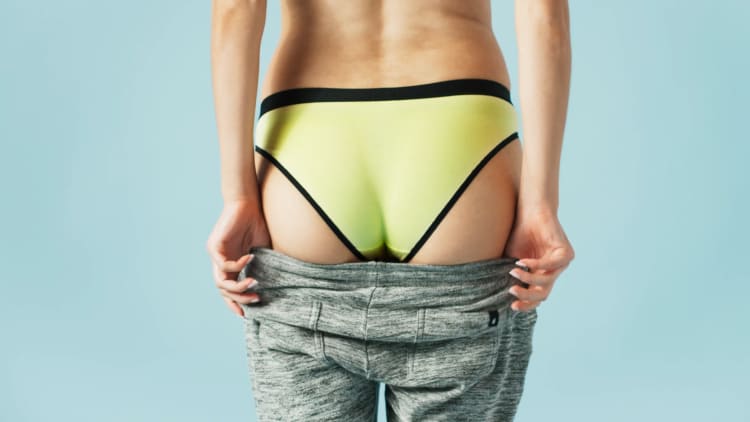Jonathan Shokrian was fed up with buying underwear, so he did something about it.
After having a "really uncomfortable" experience with a saleswoman at a department store while trying to buy underwear, Shokrian rounded up $400,000 mostly from friends and family and without much retail experience to speak of launched millennial-friendly online underwear retail start-up MeUndies in 2011.
Shokrian says MeUndies has now sold over 10 million pairs of underwear and has been profitable in each of the past three years. MeUndies has raised more than $10.4 million from outside investors and the Los Angeles-based company projects it will end 2019 with at least $75 million in annual revenue.
But it wasn't always so; MeUndies got off to slow start until it harnessed the power of social media — and provocation.
An uncomfortable start
Shokrian, 34, got the idea for his company while trying to buy enough underwear to get him through a two-week European trip with his friends nearly a decade ago.
"I found myself at the department store having a really uncomfortable interaction with this [saleswoman]," Shokrian tells CNBC Make It. "When I finally made my way to the underwear section, I was really overwhelmed with all the choices. I thought I was buying the underwear I normally buy, [but got] home to find out they're workout underwear."
Once on the trip, Shokrian complained to his friends about the experience. One of those friends was Jonathan Neman, the co-founder and CEO of fast-growing salad chain SweetGreen. Neman urged Shokrian to channel his frustration into solving the problem for himself and others.
The idea for MeUndies was born.
"I just felt like the whole process of going to the store was a little broken," Shokrian says. What's more, none of the traditional underwear brands on the market at the time really stood out to him in terms of quality or aesthetic. "They didn't resonate with me," he adds.
While Shokrian didn't have much personal experience in the ecommerce space aside from selling wholesale electronics on eBay, he'd seen other online retail brands like Warby Parker and Everlane find success with the direct-to-consumer business model, so he looked to carve out a similar space for selling underwear online.
Shokrian says initial sales were steady, but slow after the company launched eight years ago. "It took us four years to sell our first million pairs [of underwear], but then it took us three years to sell our next 8 million," he tells CNBC Make It.
So what accounted for the sales boom four years after MeUndies hit the market? Part of it was word-of-mouth marketing spread mostly via social media and ads on popular podcasts like "Stuff You Should Know" and "The Joe Rogan Experience."
MeUndies has nearly half a million Facebook followers and another 340,000 on Instagram, with celebrities like Kylie Jenner and the Hadid sisters endorsing the products on social media. (Both endorsements were unpaid, says the company, which sent products to Jenner ahead of her endorsement. The Hadids' endorsement stemmed from their friendship with Shokrian.)
Meanwhile, it was also around this time that the company started showing its willingness to take risks with provocative advertising, which courted controversy, but it also helped MeUndies steal the spotlight.
Provoking a reaction
In 2014, MeUndies' role as provocateur started making headlines after Facebook blocked some of its ads, saying some photos of scantily-clad models in the company's underwear were in violation of Facebook's advertising guidelines. (Facebook says ads can't contain "nudity or implied nudity" as well as "excessive visible skin or cleavage.") MeUndies responded with a cheeky ad campaign featuring stick figures with their nether regions blurred out and which announced that the company's content had been "banned by Facebook." (Eventually, Facebook got in touch with MeUndies, the company said at the time, to help the underwear company better understand Facebook's terms of service for advertisers.)
"We took it as an opportunity to, kind of, poke fun at them," Shokrian says, which allowed the company to "get some media out of it." In fact, the attention from the retaliatory ads not only boosted MeUndies' public profile, but it also allegedly helped drive sales, with the company claiming "record revenue" in the days following the controversy.
MeUndies also made a name for itself with other provocative (and potentially risky) marketing stunts, such as placing ads on a porn website called PaintBottle.com in 2013. The site (which is no longer active) had just launched as a supposedly cleaner, more female-friendly alternative to traditional porn sites and it was seeking more mainstream advertisers, Shokrian notes.

Other examples of MeUndies seeking attention by taking risks with its marketing include giving an endorsement deal to then Dallas Cowboys running back Joseph Randle in 2014 after Randle had been arrested for shoplifting underwear. MeUndies also joined forces with now-retired NFL running back Marshawn Lynch after he'd been fined by the NFL for grabbing his crotch while celebrating a 2014 touchdown (Lynch claimed he was adjusting his underwear). The company offered to match Lynch's fines by donating $20,000 to charity.
Jeff Fromm, a millennial marketing expert and president of consumer trends consultancy FutureCast, tells CNBC Make It that, while there are risks, MeUndies has shown an ability to generate controversy in a way that helps create more brand awareness.
"They understand that great brands are part of cultural conversations and they're doing things within their brand authority and within their personality that allow their brand to become part of conversations," Fromm says.
Meanwhile, Shokrian had his own controversy: In 2014, he was sentenced to just over a year in federal prison after pleading guilty to violating the 2008 Clean Air Act — a case that stemmed from an improper asbestos removal Shokrian oversaw at a Texas property owned by his family's company. Shokrian ultimately served just seven months in prison, and now he thinks the experience can serve as an example of "turning a negative situation into a positive." Shokrian stepped aside as MeUndies CEO when he went to prison, with Bryan Lalezarian taking on that role for four years until Shokrian was named CEO once again in 2018.
"With darkness, there's always light at the end of the tunnel, and we really like to be an optimistic company and really be encouraging to people and really show that there is change possible," Shokrian says.
Shaking up the market
Shokrian set out to make comfortable underwear at a reasonable price that's easy to buy online. And for the most part, he seems to have done that. After "testing a lot of different fabrics," Shokrian says, including traditional cotton MeUndies are made with Lenzing MicroModal, a lightweight and moisture-wicking fabric made from beechwood pulp by an Austrian company. The fabric is often used by luxury undergarment brands, as it's known for being ultra-soft and breathable.
The reviews of MeUndies are mostly positive (BuzzFeed called the underwear "so freakin' comfy"), though there are some complaints about things like poor customer, lost orders and problems returning underwear that did not fit on sites like SiteJabber.com and Consumer Affairs.
Shokrian says MeUndies' return policy is "second to none," and a MeUndies spokesperson says the company says "if a customer isn't happy with any given order, we'll do everything we can to make it right."
Originally a subscription service where customers could pay $16 per month to have a new pair of underwear shipped to them, MeUndies has added additional products, such as socks and loungewear like t-shirts and pajamas, as well as matching couples underwear sets (a matching set costs $42 total).
While subscriptions still account for about half of MeUndies' business, the company says, and MeUndies also added an a la carte option a few years after launching, allowing customers to individually purchase underwear for $20-$24.
By comparison, Calvin Klein sells three-packs of its classic boxer briefs for $39.50, so about $13 per pair, while fellow direct-to-consumer underwear start-up Tommy John sells boxer briefs for more than $30 per pair. Millennial-friendly start-up, ThirdLove, sells women's underwear for anywhere from $10 to $18 per pair.
MeUndies opened a flagship store in Los Angeles in May 2018.
MeUndies, along with its competition, have benefited in recent years as some (especially younger) consumers have begun turning away from traditional brands like Victoria's Secret and Hanes. Online sales of men's and women's underwear (including socks and lingerie) in the US increased 5%, to $4.7 billion, in the 12 months ending February 2019, even as overall sales dipped slightly, according to market research firm NPD Group.
MeUndies and other digital-focused start-ups have been able to offer quality products and a "frictionless shopping experience," according to Oliver Chen, a senior retail analyst at Cowen and Company.
They've also had the ability to build their brands around ideas and issues that millennial and Generation Z customers care about, such as authenticity and body positivity. "Imperfection is more celebrated" in our culture today, Chen notes. "It's normal people selling stuff to normal people, often."
Indeed, MeUndies' Instagram feed includes a wider variety of body types modeling the company's products (including some customer-submitted photos) than the typical Victoria's Secret supermodels.
Chen says smaller digital start-ups like MeUndies definitely have the potential to continue disrupting the traditional underwear market, though the company still represents a very small piece of the over $20 billion undergarment market. Even though Victoria's Secret's sales have dipped recently, the company still reported $3.2 billion in revenue in 2018.
"The 'to be determined' is how do the small brands scale?" Chen says.
"We're always looking for that next milestone and really excited to constantly improve the product and take this company to the next level," Shokrian says.
Don't Miss: How Allbirds went from Silicon Valley fashion staple to a $1.4 billion sneaker start-up
Like this story? Subscribe to CNBC Make It on YouTube!



